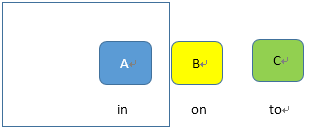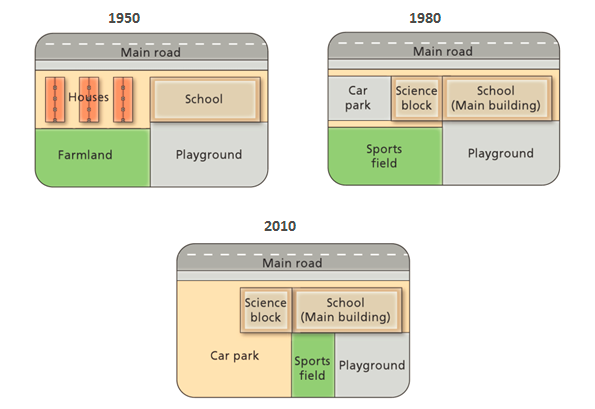雅思写作分为小作文和大作文,而小作文中又分为很多题型,其中地图题便是小作文里边的家常便饭。地图题在许多的烤鸭心中就如同妖魔鬼怪一般难以征服,为了帮助大家面对地图题迎刃而解,今天新航道老师和大家一起重新认识和学习地图题。
地图题在某种程度上与动态图有相似之处,即描述随着时间的发展事物发生的改变,与动态数据图不同的是,地图题没有数据只需要描述变化即可。地图题的写作要点包括:1. 时态,2. 内容分段及参照物;3. 词汇,4. 复杂句式。
一、时态
写地图题之前,我们首先要确定写作的时态。
1)如果图中有两个时间且都是过去时,那么在描述张图时我们要用一般过去时,描述第二张图时要用过去完成时;
2)如果图中有两个时间,一个是过去时,一个是现在时,那么在描述张图时我们要用一般过去时,描述第二张图时要用现在完成时;
3)如果图中有两个时间,一个是现在时,一个是将来时,那么张图用一般现在时,第二张图用一般将来时。
二、内容分段及参照物
大部分情况下,地图题包含两张或三张图片,最简单的分段方式是一图一段。张图:客观描述图中的事物及方位;第二张图:与前一张图对比,描述变化;第三张图:与前一张图对比,描述变化。
找准参照物也是地图题的写作要点之一,需要注意的是,不能把图中没有介绍过的新事物做描述方位的参照物(这是很多考生常犯的错误)。一般来说,在描述内容时,整体范围、写过的事物或者已知不变的事物可以做参照物。
三、词汇
在描述张图时,需要掌握一些基本的方位表达。
1)在描述方位时,不能说“在某事物的上边/下边/左边/右边”。绝大多数时都用“在某事物的东边/西边/南边/北边(in the east/west/south/north of …)”,如果有特定的入口方向时,也可以适当使用“在某事物的前面/后面(in front of …/behind …)”。另外,在表达“在……的东北/西南边”时,通常是“南北在前,东西在后”,即in the northeast/southwest of …。
2)在表达“某物位于某个方位”时,不能用have(这是很多考生常犯的中式表达错误),正确的表达是:be located, lie in, there be。
例如:小岛的南边有一些小木屋。
错误表达:The island has some huts in the south.
正确表达:There are some huts in the south of the island.
Some huts are located in the south of the island.
Some huts lie in the south of the island.
3)方位介词也是一个重要的知识点,在范围内的某个方向用in,在范围之外的某个方向且相邻时用on,在范围之外的某个方向且有距离时用to,如图所示:

a) A is in the east of the village.
b) B is on the east of the village.
c) C is to the east of the village.
在描述第二张图时,切记不要单纯地描述事物及方位(这也是很多考生常犯的错误),需要对比前一张图描述出图中的“变化”。常考的“变化”级相关表达如下:
a) 面积增大:be enlarged/expanded/extended
b) 面积减小:shrink/be reduced
c) 建筑拆除:be knocked down/pulled down/demolished
d) 建筑新建:be built/constructed/erected
e) 旧物改造:be converted/transformed into,be replaced by
四、复杂句式
复杂结构是写作高分的必备条件之一,因此地图题要想取得一个漂亮的分数,复杂句式必不可少的。很多考生困惑的是,如何才能写出复杂句呢?小作文在内容相对固定的情况下,必须尝试把两个甚至多个信息组合在一起才能有机会写出复杂句式。需要提醒的是,地图题的信息组织要逻辑清晰,尽可能地把关系密切的事物写在一起,这样既可以避免不必要的重复,也可以顺利使用下面的句式。常用的句式有:
a) 当两个句子中有同一个名词重复出现时,可以用which定语从句;
b) 当两个句子中有同一个方位重复出现时,可以使用where定语从句;
c) 当同一个主语有两个动作同时发生时,可以使用伴随状语:主语+V1,V2-ing;
d) 当两个短句没有以上关系时,可以使用with+名词+分词的结构;
下面以OG-Test 3为例,具体展示上述四个方面的具体应用。
The diagram shows the changes that had taken place at West Park Secondary School since its construction in 1950. Summarise the information by selecting and reporting the main features, and make comparisons where relevant. |

题目解析:
a) 本题有三张图片,所有时间均为过去时,所以主体部分写三段,一图一段。
b) 张图用一般过去时描述图中有哪些事物及其方位,第二张图以过去完成时为主对比前图描述变化;第三张图也以过去完成时为主对比前图描述变化。
c) 在描述张图时,可以用整体或已知不变的Main road做参照物,之后描述其他事物时可以用写过的事物做参照物。
参考例文
注:蓝色字体是词汇,黑色加粗下划线部分是高分句式。
开头段(改写题目)
The diagrams show West Park Secondary School at three different stages in its development: 1950, 1980 and 2010.
张图(客观描述事物及方位,一般过去时)
In 1950, the school was built close to the main road, with a playground lying on its south. On the west of them were a large residential area and an expanse of farmland.
第二张图(重点描述事物的变化,过去完成时和过去时)
Thirty years later, the houses had been demolished to make way for a small car park and a science block which was constructed adjacent to the school’s main building. Another impressive change is the original farmland had been replaced by a sports field, while the existing playground remained unchanged.
第三张图(重点描述事物的变化,过去完成时和过去时)
The year of 2010 witnessed some other significant changes. To be specific, the car park had been enlarged to the south, occupying the former sports field. As for the playground, it had shrunk by half to accommodate a new smaller sports field. Besides, it is noticeable that no changes occurred in the other facilities.
总结(主要变化)
Overall, the school had been modernized over the six-year period, with more land used for teaching, parking and entertainment.